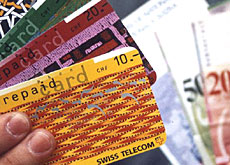Swiss phone cards help trace al-Qaeda

Fresh details have emerged of how al-Qaeda’s use of Swiss mobile phones allowed authorities in several countries to track and arrest its members.
An article in “The New York Times” on Thursday describes how supporters of Osama bin Laden’s network used the prepaid phones to coordinate their activities.
According to the report, the interception of calls and the resulting investigation led to the arrest of several al-Qaeda leaders and dozens of operatives.
Shortly after it first transpired that al-Qaeda operatives had used the phones, the Swiss parliament approved a law prohibiting the sale of Subscriber Identity Module (SIM) cards without registering personal details.
The bill, which was passed a year ago, comes into effect on July 1.
SIM cards can be purchased anonymously for use around the world.
Calls logged
“The New York Times” says the investigation first got underway on April 11, 2002, when Christian Ganczarski – who was under surveillance by German authorities for ties to al-Qaeda – made a call to Karachi, Pakistan.
Weeks later, in a search of Ganczarski’s home in Duisberg, authorities reviewed his call log and traced the Karachi number.
In March last year, authorities in Pakistan began to monitor the phone number. This led to the arrest in Rawalpindi of Khalid Shaikh Mohammed, who is accused of masterminding the September 11 attacks in the United States.
His computer and mobile phones contained 6,000 numbers that the authorities used to track suspected terrorists.
In April 2003, authorities in Indonesia broke up a terror cell after investigators traced the destination of many of the calls Mohammed placed before his arrest.
“The big guy”
In June, investigators monitoring cellular phones heard conversations about a visit from “the big guy”. The authorities had his phone number and were able to arrest Abdulla Oweis, a mid-level al-Qaeda operative in Qatar, a month later.
Finally, in January, the authorities in Switzerland used mobile phones to trace and arrest eight people accused of being a logistical cell for al-Qaeda.
Some are suspected of helping with the suicide bombings of the housing compounds in Riyadh, Saudi Arabia, which killed 35 people.
Mobile-phone operators in Switzerland now have to register prepaid customers and keep this information for two years after the phone is purchased.
Opponents say the new regulations will not deter terrorists and other criminals, as they will still be able to buy prepaid phones in other countries, including the US.
Intelligence experts told “The New York Times” that terror suspects have largely abandoned the use of prepaid phones for important communications and were now using email, internet phone calls and hand-delivered messages.
They also say criminals are also more likely to buy a second-hand phone.
swissinfo
The Swiss parliament has ordered mobile phone operators to register their prepaid customers in a bid to prevent criminals and terrorists from using them in anonymity.
Previously, customers were not required to give their personal details when buying a prepaid mobile.
Swiss authorities acted after it had emerged that senior members of the al-Qaeda network used Swiss prepaid mobiles to coordinate their activities.

In compliance with the JTI standards
More: SWI swissinfo.ch certified by the Journalism Trust Initiative










You can find an overview of ongoing debates with our journalists here . Please join us!
If you want to start a conversation about a topic raised in this article or want to report factual errors, email us at english@swissinfo.ch.